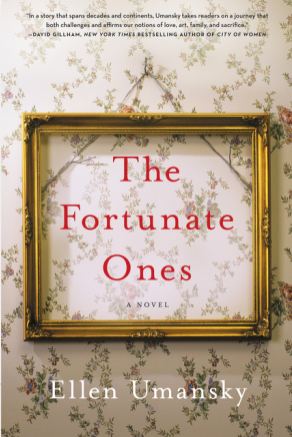
by Yona Zeldis McDonough
“The Fortunate Ones” — An Excerpt from Ellen Umansky’s New Novel
 Back in summer 2011, Lilith published Take the A Train to Scotland, from a novel-in-progress by Ellen Umansky. The novel, now called The Fortunate Ones, has undergone a sea change (Umansky says that the section that appeared in Lilith did not make it into the final version of the novel) and is poised to make its debut on February 14.
Back in summer 2011, Lilith published Take the A Train to Scotland, from a novel-in-progress by Ellen Umansky. The novel, now called The Fortunate Ones, has undergone a sea change (Umansky says that the section that appeared in Lilith did not make it into the final version of the novel) and is poised to make its debut on February 14.
The story begins in 1939 in Vienna, and as the specter of war looms over Europe, Rose Zimmer’s parents are desperate to flee. Unable to escape themselves, they manage to secure passage for their young daughter on a kindertransport, and send her to live with strangers in England. When the war is finally over in 1946, a grief-stricken Rose attempts to build a life for herself. Alone in London, she becomes increasingly focused on trying to retrieve a bit of her lost childhood: the Chaim Soutine painting her mother had held precious.
Many years later, the painting finds its way to America. In modern-day Los Angeles, Lizzie Goldstein has returned home for her father’s funeral. Newly single and unsure of her path, she carries a burden of guilt that cannot be displaced. Years ago, as a teenager, Lizzie threw a party at her father’s house with unexpected but far-reaching consequences. The Soutine painting that she loved and had provided lasting comfort to her after her own mother had died was stolen, and has never been recovered. This painting will bring Lizzie and Rose together and ignite an unexpected friendship that excavates painful and long-held secrets. Below is an excerpt from The Fortunate Ones:
“At least he doesn’t look Jewish,” Rose overheard her mother say to her father. It was true; Gerhard was rangy and blond, and at sixteen he had a good couple of inches on their father, hitting six feet. Rose knew that Gerhard’s looks brought her parents no small amount of comfort as they thought about him on the streets alone. She tried not to think about her own dark complexion.
In early November, a Jew murdered a Nazi in Paris. School was let out early, and Rose was told to hurry home, avoid the main thoroughfares and the trams. In the flat, they gathered around the wireless, glued to the broadcasts. Her parents wouldn’t let her go outside for days.
There were so many stories swirling: her mother’s old piano teacher, Herr Schulman, had been arrested and was being held in Dachau. The Begeleisens had had their apartment repatriated— soldiers had come in the graying hours of dawn—and had been forced to move into a flat with three other families. Rose hadn’t liked Peter Begeleisen; he had told her that witches like to yank teeth out of the mouths of little girls in the middle of the night, but still she felt bad for them. The Volkmans had managed to get out last week, their visas came through for Ireland. The husband had been able to land work as a machinist for a clothing factory outside of Belfast.
Their friends the Klaars had taken out a small classified advertisement in the Jewish Chronicle, seeking work in London, and Rose’s parents decided to follow suit. They fought over the language in the ad. They fought a lot those days.
Wolfe wrote: “Would noble-minded people assist Viennese couple, capable of every kind of housework, knowledge of English, French, and Italian? Exemplary references upon request.”
“No one cares what languages we speak,” Charlotte said to Wolfe. He was sitting in the velvet wingback chair near the window, trying to balance the writing tablet on his knee in the watery light of the late afternoon. He now avoided his study.
“What do you suggest?”
Charlotte took the writing paper out of his hands. Wolfe played with the loose ivory threads from the Persian throw covering the velvet head cushion. His wide face looked slack, jowly.
She wrote: “Married couple, cook and footman, Jews, seek position in household.”
“Everyone knows we’re Jews,” he said bitterly. “Why else would we be looking for work?”
“Then we shouldn’t hide from it, should we?” Her mother said the words with such sharpness that Rose half expected blood to bloom.
Yona Zeldis McDonough, Lilith’s fiction editor, introduce an excerpt from Ellen Umansky’s The Fortunate Ones.
The views and opinions expressed in this article are the author’s own and do not necessarily reflect those of Lilith Magazine.